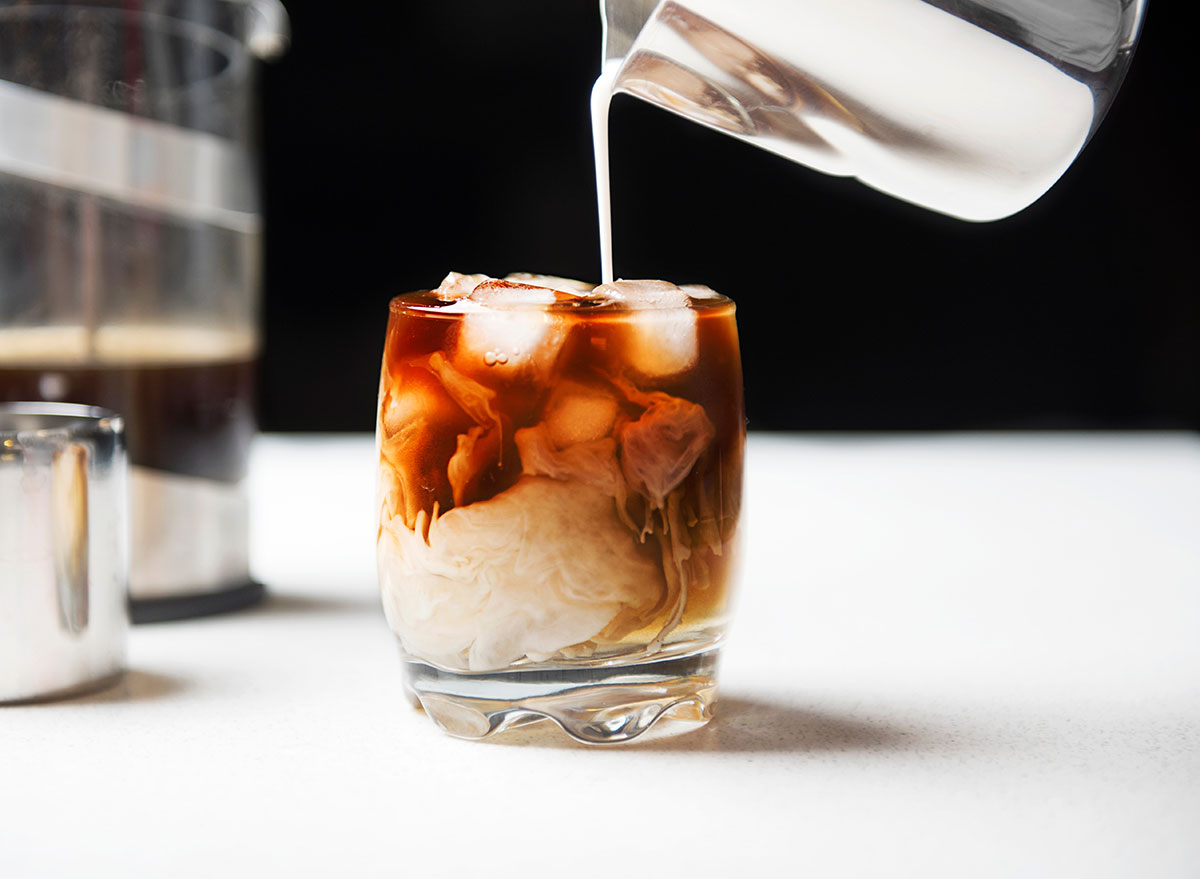Side Effects of Drinking Too Much Decaf Coffee, According To An Expert

If you love the taste of coffee—but don’t want the side effects of caffeine—decaf is definitely a viable solution. Whether caffeine makes it harder for you to get adequate sleep, interacts with prescription medications that you’re taking, or you’re just extra sensitive to it, there are obvious benefits to making the switch to decaf coffee. However, there are some negative side effects that can come with drinking too much decaf coffee as well.
First of all, it’s important to note that decaf coffee is not totally devoid of caffeine—it typically contains about 3 milligrams per cup, versus 85 milligrams in a standard cup of regular coffee. According to a 2017 systematic review, the composition of decaf coffee is highly similar to regular coffee, which suggests that it may boast many of the same health benefits—like lowering your risk of skin, liver, prostate, endometrial, and oral cancer, as well as leukemia. Not only that, but studies have found a link between drinking decaf coffee and a reduced risk of premature death, death from cardiovascular causes, and type 2 diabetes.
According to Sean Allt, nutrition coach at Innovative Fitness, the question of whether decaf coffee is healthier depends on whether you have the “fast” or “slow” version of a particular gene: CYP1A2.
“This gene determines how effectively your body metabolizes caffeine,” he says. “If you’re a slow metabolizer of caffeine, then decaf coffee (or tea) would be a healthier option for you. If you’re a fast metabolizer then you’re likely okay sticking to fully caffeinated coffee. And just because caffeine doesn’t keep you up at night, doesn’t necessarily mean that you’re a fast metabolizer of it. Its effects as a stimulant are based on how easily it binds to receptors in your nervous system, whereas it is metabolized in your liver.”
So, what are the potential consequences of downing too much decaf coffee? Here’s what you should know, and for more helpful tips, be sure to check out our list of The 7 Healthiest Foods to Eat Right Now.
Your teeth might show signs of damage.

“Decaf coffee, like its fully caffeinated counterpart, can stain your teeth,” says Allt.
And that’s not all—in addition to discoloring your pearly whites, Allt also says it can cause more serious damage.
“Though less acidic than full-strength coffee, decaf coffee is still acidic in nature, which means that excessive consumption can erode the natural enamel of your teeth over time, making them more sensitive and susceptible to cavities,” he adds.
Some dentists recommend drinking water in between cups of coffee in order to reduce the negative effects of so much acidity.
Plus, you can strengthen your teeth with these 25 Foods You Had No Idea Are Good for Your Teeth.
You may have to go to the bathroom—a lot.

Just like regular coffee, decaf also increases the production of gastrin in the gut. Gastrin, a handy little hormone that triggers the release of stomach acid, helps the body to break down the proteins in the food you eat and absorb the vitamins in them more effectively. However, an increase in gastrin can push your gut to move digestion along a little faster than it normally would. That means if you’re pounding decaf coffee all morning and afternoon, you’ll probably end up running to the bathroom a lot. By the way—extremely high levels of gastrin can be dangerous—some of the milder side effects include diarrhea, but more severe cases may lead to stomach and small intestinal ulcers.
Get even more healthy tips straight to your inbox by signing up for our newsletter!
It might be harder to lose weight.

If you’re trying to shed some pounds, drinking lots of decaf coffee may make that more difficult for several reasons—particularly the added sugars that are in your decaf coffee beverages.
“Coffee is a bit of a ‘gateway caloric beverage’ in that—depending on how you take it (amount of milk, cream, sugar, etc.)—the calories can add up pretty quickly, which can lead to weight gain and/or difficulty losing weight,” says Allt.
Of course, if you drink your decaf coffee black, or with a splash of milk, then you don’t have to worry about it sabotaging your efforts to slim down. However, it may not help, either. Regular coffee contains caffeine, a stimulant that has been found to boost your metabolism as well as stimulate your body to break down fat cells. Since decaf only contains trace amounts of caffeine, it’s not likely to have this effect.
Instead, make healthier coffees at home with these 12 Tastiest Homemade Coffee Drinks From a Nutritionist.
Your cholesterol may suffer.

A 2005 study discovered that participants who drank three to six cups of decaf coffee a day experienced an increase in LDL or “bad” cholesterol. Interestingly, this effect was not observed in the group who drank regular caffeinated coffee. Decaf coffee was also found to increase levels of specific blood fat in the body that’s associated with metabolic syndrome. Metabolic syndrome refers to a cluster of harmful heart disease risk factors.
Researchers noted that this effect is unlikely to happen if you only have one cup of decaf coffee a day—but they added that people concerned about their LDL cholesterol should think twice about drinking a lot of it.
You may develop an iron deficiency.

Both regular and decaf coffee contain polyphenols, powerful micronutrients that can play a role in preventing a slew of diseases. But research has shown that these polyphenol compounds—specifically, chlorogenic acid—can also inhibit your body’s absorption of non-heme iron (the kind found in plant-based foods). An iron deficiency can cause brittle nails, changes in taste, hair loss, and in more serious cases, anemia. Fortunately, it seems that polyphenols only latch on to iron if they’re ingested simultaneously, so you can avoid this by not drinking decaf coffee at the same time you’re eating iron-containing food.
Here’s What Happens To Your Body When You Drink Decaf Coffee.
You’ll have a higher risk of rheumatoid arthritis.

Rheumatoid arthritis is an autoimmune disease that causes swelling, aching, stiffness, and tenderness in the joints and other parts of the body. The specific causes of this painful disease are not yet known, but according to the Centers for Disease Control & Prevention, some factors can increase the risk of developing it, such as smoking or early-life exposure to smoke and obesity.
A large 2002 study of 31,336 women ages 55 to 69 determined that those who drank four or more cups of decaf coffee a day had a higher risk of rheumatoid arthritis—and surprisingly, caffeinated coffee did not pose this risk. Researchers still have not determined the reason for this link, but if you already know you’re at risk for rheumatoid arthritis, you may want to limit your decaf coffee intake to two cups or less.
You could be ingesting a toxic chemical

You might want to take a closer look at the label on the decaf coffee you’re buying. A 2020 investigation of 24 of the leading coffee brands conducted by the Clean Label Project found “quantifiable amounts” of a toxic chemical called methylene chloride, which is commonly found in paint stripper, in many of their decaf products. Methylene chloride, which has been banned by the U.S. Environmental Protection Agency, has been linked to multiple cancers, asphyxiation, cognitive impairment, and liver, kidney, and reproductive toxicity.
To make sure your decaf java is safe to drink, check out the Clean Label Project’s list of brands and products that were not detected to contain methylene chloride. You can also check the label for words like “chemical-free,” “Swiss-water,” or “certified organic,” all of which indicate that the decaffeination process didn’t involve harsh chemicals.
Ultimately, when it comes to the potential side effects or risks that come with having decaf coffee, it all depends on the quality of your current health—but even more so, how much you’re drinking on a daily basis. So, to be on the safe side, Allt suggests sticking to one to three cups.
“Most research that has shown the health benefits of coffee (whether fully caffeinated or decaf) has found the point of diminishing returns to be any intake above 2 to 3 cups per day,” Allt says. “In fact, many studies have found that anything above 3 cups can actually negate the benefits of more moderate consumption.”
Here are the Dangerous Side Effects of Drinking Decaf Coffee, According to Science.








